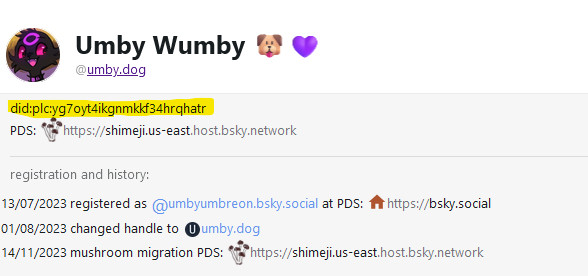Yunlong Lin, Zhenqi Fu, Kairun Wen, Tian Ye, Sixiang Chen, Ge Meng, Yingying Wang, Yue Huang, Xiaotong Tu, Xinghao Ding Unsupervised Low-light Image Enhancement with Lookup Tables and Diffusion Priors https://arxiv.org/abs/2409.18899
No, the austrian Burschenschaften have nothing in common with the liberal 19th century Burschenschaften considering their role in the conflicts in the "Deutsche Burschenschaft" which led to the leaving of the conservatives, the "Liederbuchaffäre". For upper Austria lookup "Arminia Cernowicz".
This would have been a pretty good use for this kind of tool - hiring someone with experience using a specific software, so only progressing candidates with that software named in their application. Unfortunately, HR put the wrong software name in the lookup.
when there's an account which you think should be blocked and want to to tell others about it, along with posting its handle, be sure to include that account's DID! it's the thing that looks like this: did:plc:yg7oyt4ikgnmkkf34hrqhatr you can find it on clearsky.app by looking up the profile

DUPLEX: Scalable Zero-Knowledge Lookup Arguments over RSA Group (Semin Han, Geonho Yoon, Hyunok Oh, Jihye Kim) ia.cr/2024/1509
![Abstract. Lookup arguments enable a prover to convince a verifier that a committed vector of lookup elements f⃗ ∈ 𝔽^(m) is contained within a predefined table T ∈ 𝔽^(N). These arguments are particularly beneficial for enhancing the performance of SNARKs in handling non-arithmetic operations, such as batched range checks or bitwise operations. While existing works have achieved efficient and succinct lookup arguments, challenges remain, particularly when dealing with large vectors of lookup elements in privacy-sensitive applications.
In this paper, we introduce $\duplex$, a scalable zero-knowledge lookup argument scheme that offers significant improvements over previous approaches. Notably, we present the first lookup argument designed to operate over the RSA group. Our core technique allows for the transformation of elements into prime numbers to ensure compatibility with the RSA group, all without imposing substantial computational costs on the prover. Given m lookup elements, $\duplex$ achieves an asymptotic proving time of O(mlogm), with constant-sized proofs, constant-time verification, and a public parameter size independent of the table size N. Additionally, $\duplex$ ensures the privacy of lookup elements and is robust against dynamic table updates, making it highly suitable for scalable verifiable computation in real-world applications.
We implemented and empirically evaluated $\duplex$, comparing it with the state-of-the-art zero-knowledge lookup argument Caulk [CCS’22]. Our experimental results demonstrate that $\duplex$ significantly outperforms Caulk in proving time for both single and batched lookup arguments, while maintaining practical proof size and verification time.](https://cdn.bsky.app/img/feed_fullsize/plain/did:plc:fwa55bujvdrwlwlwgqmmxmuf/bafkreihc3droxwg4swrq3ypqlqxpgymcxlrwbgbvkb2tmsqqcoxbhvq6uq@jpeg)

I have... Lookup nomnom000 and it should lead to mine even though I barely play PlayStation these days 😭
🐦⬛ ... huh, I typed "raven" into the emoji lookup, but that's definitely a blackbird. Which, no matter how loudly it rustles in the undergrowth, is never going to achieve corvid levels of sinister.
or query a SQL database or a knowledge graph with SPARQL. You can do it now, but it's hit-or-miss, and a database lookup is by definition very discrete and not very optimizable through gradient descent. if you had a good way to get a gradient-free optimization of these search abstractions, yikes
i mostly want to be able to expand GETTABLE and friends into an explicit getmetatable lookup to a stack value and then fold duplicate getmetatables away; this requires both being able to move around the lua stack values and also being able to do aliasing analysis to prove the metatable doesnt change



